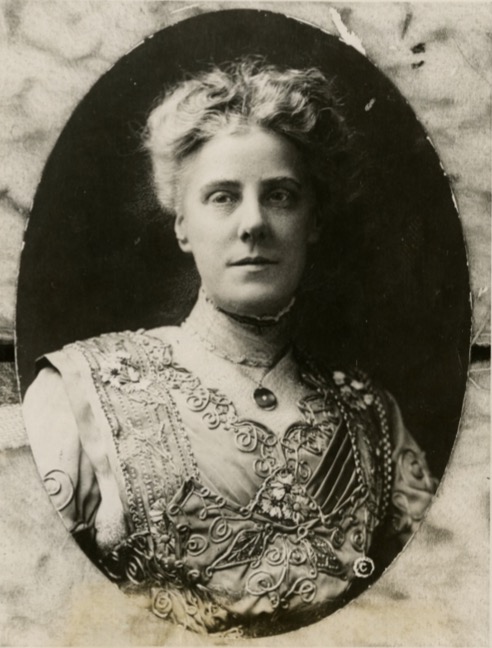Germanna Foundation takes the time to honor and remember our mothers and foremothers.
Pioneering women in North America have been around for centuries. 400 years ago, in 1619, more than 100 women were brought to Jamestown as a way of bringing stability to Virginia and ensuring the first permanent English settlement would grow and flourish.
Less than 100 years later, Virginia saw two new settlements with the arrivals of the first and second colonies from Germany in 1714 and 1717. Unlike Jamestown, the groups were made of men, women, and children: families that had agreed to make the arduous trek overseas to begin life in a new world. Many women made the voyage with their husbands and children: some even gave birth while en route to Virginia.
This Mother’s Day, we hope you’ll honor the pioneering women in your life and remember the legacy of your foremothers and the impact they made not only in your family history, but our nation’s history.
Make a Donation in Honor of a Mother

Anna Jarvis, the founder of Mother’s Day, devoted years to gaining national recognition for a day to honor mothers, as a fulfillment of a dream held by her own mother—Ann Marie Reeves Jarvis.
Ann Marie was born in Culpeper in 1832, the daughter of Josiah Washington Reeves and Nancy Kemper Reeves, whose Kemper ancestor Johannes had come to Virginia in 1714 as one of the original Germanna colonists whom Lt. Governor Alexander Spotswood settled at Fort Germanna along the Rapidan River frontier.
Ann Marie’s father was a Methodist minister who was transferred in 1843 from Culpeper to Philippi, now in West Virginia, when she was a girl.
Ann Marie married Granville Jarvis, a successful merchant, and was mother to eleven children, but only four reached adulthood. She organized Mother’s Day Work Clubs to improve health and sanitary conditions for families in several towns.
 When war broke out and the western part of Virginia broke away and formed the new state of West Virginia, Ann Marie Jarvis urged her Mother’s Day Clubs to declare neutrality and provide aid to both Confederate and Union troops. For many years after the war, she spoke of her dream to have a day in which Americans would honor mothers. After her husband died, she moved to Philadelphia, where she died in 1907.
When war broke out and the western part of Virginia broke away and formed the new state of West Virginia, Ann Marie Jarvis urged her Mother’s Day Clubs to declare neutrality and provide aid to both Confederate and Union troops. For many years after the war, she spoke of her dream to have a day in which Americans would honor mothers. After her husband died, she moved to Philadelphia, where she died in 1907.
Her daughter Anna Jarvis (1864-1948) began her campaign for the creation of a national Mother’s Day on the first anniversary of her mother’s death. She gained the support of the Philadelphia philanthropist John Wanamaker, and by 1909 there were unofficial Mother’s Day observations in 45 states.
Official recognition began to follow, and in 1914, President Woodrow Wilson approved a resolution adopted by both houses of Congress recognizing Mother’s Day.
How will you honor the mothers in your life?
This Mother’s Day honor your mothers and foremothers by making a donation in their name and having them placed on the Honor Roll of Mothers:
Make a Donation in Honor of a Mother
Their names will be added to Germanna’s Honor Roll of Mothers
You can also honor your mothers and foremothers by remembering to include the Germanna Foundation in your estate plans or will. By including the Germanna Foundation as a beneficiary in your will, you will help us preserve Germanna’s history and heritage for future generations.
You can name the Germanna Foundation as a beneficiary of your life insurance policy or your retirement plan (such as a 401(k), 403(b), IRA, or another pension plan). By naming the Germanna Foundation as a beneficiary, you maintain complete control over the plan while living, but at your passing the plan passes to the Germanna Foundation free of both income and estate taxes.
The Germanna Foundation can be named as a primary beneficiary for part or all of the assets in the plan, or as a contingent beneficiary, or as a beneficiary at the death of your surviving spouse. Please ask your insurance agent, your employer, or the financial institution managing your retirement plan for the proper forms.
Please consult with your attorney or personal financial advisor regarding the legal and tax benefits of all estate and planned gifts.
By making a planned gift in the form of cash, securities, real estate, or other assets, you will be investing in the continuation of the Germanna Foundation’s vital work to preserve Germanna history for years to come. If you choose to make this kind of gift, you will become a member of our Germanna Legacy Society.
By including the Germanna Foundation in your estate plans, you will honor and protect Germanna’s history for the next generation.
For more information on planned giving with the Germanna Foundation, click here.
The Germanna Foundation is a 501(c)(3) organization. Contributions are tax-deductible to the full extent of the law.

